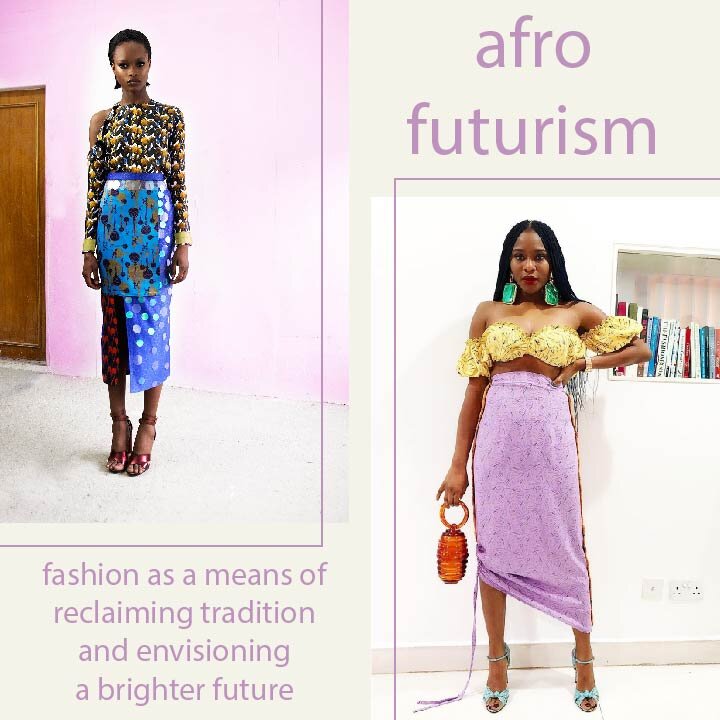Afrofuturism: Fashion As A Means Of Reclaiming Tradition And Envisioning A Brighter Future
Tearsheet By Emily McKenzie.
Afrofuturism is a cultural aesthetic that uses science-fiction, technology, history, and mysticism to address the African American experience. It uses artistic mediums to connect those from the Black diaspora with their ancestry, forgotten as a result of cultural erasure at the hands of slavery. Afrofuturism asks, “If that’s the dystopian part of the sci-fi story, what does the utopian follow up look like?” Through the sci-fi framework of this movement, Black creators envisage a future on their own terms, extinguishing the homogenized and appropriated version of Africa portrayed in the west. As emancipation from that, the movement reclaims African diasporic voices, recasting African Americans as superhuman through fashion, art, and other cultural movements. It is not simply the presence of Black characters in a futuristic story, but art that represents a visionary world that unapologetically celebrates Black uniqueness, innovation, and power.
Image Credit: Trevor Stuurman
Photographer: William Ukoh, Stylist: Daniel Obasi
Afropunk 2017, photographed by Tyler Joe
With Black Panther ’s global success in 2018, Ruth E. Carter’s designs brought Afrofuturism to the big screen showcasing the style of those that are forward-thinking and technologically advanced without conforming to the sterile, monochromatic cliché most imagine for the future. In the spirit of Afrofuturism, Carter’s fashion honors Black history in a way that depicts an affirmative future. Alongside Black Panther, events like Afropunk, a Brooklyn-based festival that features live music, film, fashion, and art produced by black influencers, and artists such as Janelle Monet have played a major role in bringing Afrofuturism into the mainstream.
Black Panther, 2018
The ArchAndroid, album by Janelle Monáe
This aesthetic goes beyond costumes and movie magic. Black designers have been creating Afrofuturist street style for years. Known for her signature Ghetto Until Proven Fashionable slogan, designer Nareasha Willis creates streetwear for the “modern-day fashion activist.”
Senegalese designer, Selly Raby Kane is known for her science-fiction inspired streetwear designed for the women of today and tomorrow. She champions Afrofuturism by marrying “fashion, immaterial heritage, and technology.”
Lisa Folawiyo’s global womenswear brand celebrates the local West African fabric, Ankara. Through a traditional Nigerian beading technique, she embraces regional materials and creates bright, feminine dresses that redefine luxury in a way that stays true to West Africa’s bold designs.
Following the Egyptian revolution of 2011, Amna Elshandaweely launched her fashion brand, which uses traditional African textiles to make streetwear. She interweaves African culture and history to create garments that “bridge the gap between identity, culture, and politics.”
Tearsheet By Emily McKenzie.
Now more than ever, it is important for the fashion world to promote social change in solidarity with the Black Lives Matter movement. Afrofuturism, a parallel narrative, puts the spotlight on Black creators and the aesthetics that they have established. By supporting designers of color, the fashion community can celebrate Blackness while reflecting on our current political climate in a meaningful way.
Article by Adele Cardani, Contributor, PhotoBook Magazine
Street Talk supports emerging artists who merit being discovered with skills such as dance, art, design, sculpture, architecture, fashion trends, shop the look, and fine art photography.



















